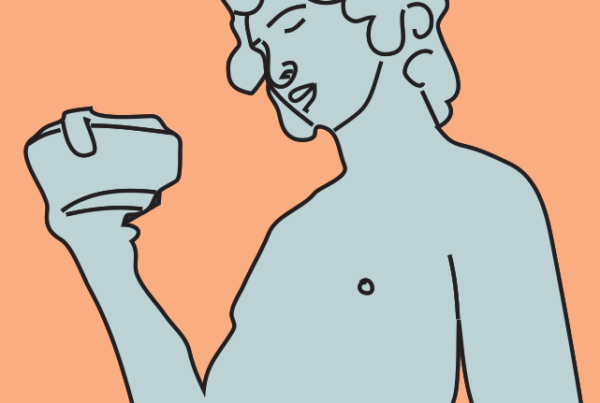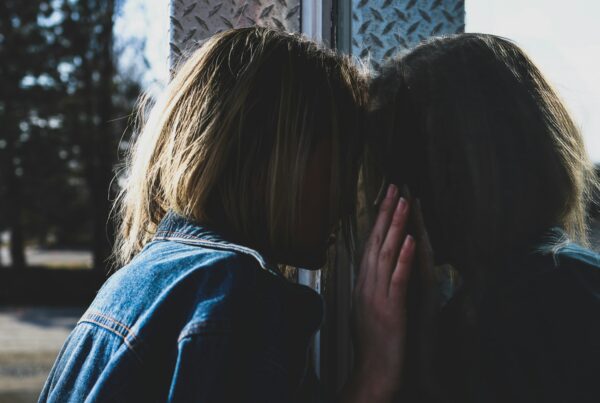

Back in the days when I tried the study Applied Psychology for a year, I ambitiously started with an internship at an organization whose mission it was to reduce loneliness among elderly by keeping them company. I expected working there to be an educational and rewarding experience. While prepared for every possible outcome, I could never have predicted the way I was emotionally touched by the fate and the isolated world of the elderly and I was left wondering whether the personal attention within the professional care for the elderly is flaking.
As I walked into a cold and small apartment to meet my client for the first time, I expected a kind old man with little sparkling eyes, who was full of interesting stories about the good old days and just needed a little company in his life. The man I met however, let’s call him Joop, did not have sparkling eyes and was not full of stories. In fact, I did not see anything in his eyes. No expression, no smile, no sign of life. He looked numb, did not say anything at all and he filled his days with staring through the window at the empty alley next to his building.
Because my client was barely able to move due to his hemiparesis, he had been forced to sit in his wheelchair at the same window for over ten years. There, he watched other people living their life, being able to go wherever they wanted to go, while, for him, everyday was the same and there was nothing he could do about it. I can imagine the frustration eventually changed his motivation from not being able to do anything, to not wanting to do anything. The only thing he seemed to care for was staring numbly at the world outside, as if he had lost all hope.
I remember feeling relieved after finding out Joop had visitors at least twice a day, even if these visitors were only the social workers, there to change his adult diaper or serve him a meal. Although the social workers did not stay for even half of the prescribed thirty minutes, I naïvely assumed Joop was never really alone.
After about three months, I discovered the painful difference between being alone and being lonely. One night no social worker came in, because of cuts in the budget. That night, Joop was not able to go to the bathroom, did not have his dinner, was not put to bed and was forced to sit in his wheelchair all night. To make matters worse, half way through the night he fell out of his wheelchair where the hard, cold floor welcomed him as his mattress for the night until he was found the next morning. I remember my heart breaking when I heard about the incident and I could not stop thinking about how lonely Joop must have felt.
This is only one of many stories, but for me, this heartbreaking experience was an eye-opener to the horrible situations that people, who are in one of the most vulnerable moments of their life, can find themselves in. With the cuts nowadays within the healthcare system, we are failing older people by not giving the help they so desperately need and deserve. Most of all, I am certain that this should never have been allowed to happen and is truly a humanitarian disgrace. For now, there may not be a quick solution to reduce these dehumanizing situations, but it would not hurt to give a little personal attention now and then to the ones you love, especially to those in need.

Back in the days when I tried the study Applied Psychology for a year, I ambitiously started with an internship at an organization whose mission it was to reduce loneliness among elderly by keeping them company. I expected working there to be an educational and rewarding experience. While prepared for every possible outcome, I could never have predicted the way I was emotionally touched by the fate and the isolated world of the elderly and I was left wondering whether the personal attention within the professional care for the elderly is flaking.
As I walked into a cold and small apartment to meet my client for the first time, I expected a kind old man with little sparkling eyes, who was full of interesting stories about the good old days and just needed a little company in his life. The man I met however, let’s call him Joop, did not have sparkling eyes and was not full of stories. In fact, I did not see anything in his eyes. No expression, no smile, no sign of life. He looked numb, did not say anything at all and he filled his days with staring through the window at the empty alley next to his building.
Because my client was barely able to move due to his hemiparesis, he had been forced to sit in his wheelchair at the same window for over ten years. There, he watched other people living their life, being able to go wherever they wanted to go, while, for him, everyday was the same and there was nothing he could do about it. I can imagine the frustration eventually changed his motivation from not being able to do anything, to not wanting to do anything. The only thing he seemed to care for was staring numbly at the world outside, as if he had lost all hope.
I remember feeling relieved after finding out Joop had visitors at least twice a day, even if these visitors were only the social workers, there to change his adult diaper or serve him a meal. Although the social workers did not stay for even half of the prescribed thirty minutes, I naïvely assumed Joop was never really alone.
After about three months, I discovered the painful difference between being alone and being lonely. One night no social worker came in, because of cuts in the budget. That night, Joop was not able to go to the bathroom, did not have his dinner, was not put to bed and was forced to sit in his wheelchair all night. To make matters worse, half way through the night he fell out of his wheelchair where the hard, cold floor welcomed him as his mattress for the night until he was found the next morning. I remember my heart breaking when I heard about the incident and I could not stop thinking about how lonely Joop must have felt.
This is only one of many stories, but for me, this heartbreaking experience was an eye-opener to the horrible situations that people, who are in one of the most vulnerable moments of their life, can find themselves in. With the cuts nowadays within the healthcare system, we are failing older people by not giving the help they so desperately need and deserve. Most of all, I am certain that this should never have been allowed to happen and is truly a humanitarian disgrace. For now, there may not be a quick solution to reduce these dehumanizing situations, but it would not hurt to give a little personal attention now and then to the ones you love, especially to those in need.


